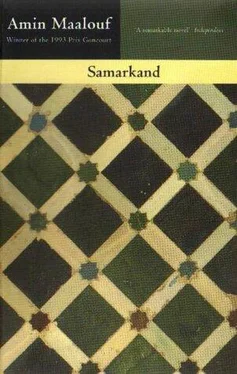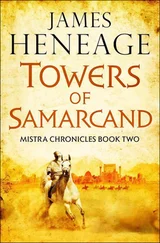Twice a day the Khan would arise followed by his retinue and would go off to inspect a mulberry patch or be acclaimed by his soldiers or the populace. During one of these rounds some young townspeople attempted to approach the monarch. Held at a distance by the guards, they yelled out that they were ready to fight alongside the soldiers and to die in defence of the city, the Khan and the dynasty. Far from rejoicing at their initiative, the sovereign was irritated, broke off his visit to retrace his steps and ordered the soldiers to disperse them roughly.
When he was back in the palace, he addressed his soldiers:
‘When my grandfather, may God preserve in us the memory of his wisdom, wished to capture the city of Balkh, the inhabitants took up arms in the absence of their sovereign and killed a large number of our soldiers, forcing our army to retreat. My grandfather then wrote a letter to Mahmoud, the master of Balkh, in which he rebuked him: ‘I most ardently desire our troops to clash, may God grant victory to whom he wishes, but where will we end up if the common people start meddling in our quarrels?’ Mahmoud sided with him and punished his subjects, forbidding them to carry arms. He fined them great amounts of gold to make up for the destruction the clashes had caused. What was true for the people of Balkh was even more so for those of Samarkand who are by nature rebellious. I would rather betake myself to Alp Arslan alone and unarmed than owe my safety to the citizenry.’
The officers all fell in with his view. They promised to repress any popular zeal, renewed their oaths of allegiance and swore to fight like wounded wildcats. These were not just words. The Transoxanian troops were no less brave than those of the Seljuks. Alp Arslan had only the advantage of numbers and age. Not his age, that is, but that of his dynasty. He belonged to the second generation which was still animated by the ambition of empire-builders. Nasr was the fifth of his line and much more desirous of enjoying his acquisitions than of expansion.
During this whole period of agitation, Khayyam wanted to stay well away from the city. Naturally he could not refrain from putting in a brief appearance at court or at the qadi’s palace from time to time without seeming to desert them in their ordeal. However, most often he would stay shut up in his belvedere, immersed in his works or in his secret book whose pages he was furiously blackening as if the war only existed in the detached wisdom which was inspired in him.
Only Jahan brought him back to the reality of the drama happening around them. Every evening she would bring him the latest news from the front and report the moods of the palace to which he would listen without obvious enthusiasm.
On the ground, Alp Arslan’s advance was slow. He was weighted down with excess troops, discipline was slipshod and he had to contend with illness and the swamps as well as occasional outbreaks of fierce resistance. One man in particular was making the Sultan’s life hard. He was the commander of a fortress not far from the river. The army could have skirted around it and continued to advance, but its rear would have been less secure, harassments would have continued and in case of difficulty any retreat would have been turned out to be perilous. Alp Arslan thus had given the order to put the fortress out of action ten days earlier and they had made numerous assaults on it.
The battle was being followed very closely from Samarkand. Every three days a pigeon would arrive, released by the defenders. The message was never an appeal for help. It did not describe the exhaustion of supplies or men, it spoke only of adverse losses and rumours of epidemics rife amongst the besiegers. Overnight the commander of the site, a certain Yussif, originally from Khwarazm, became the hero of Transoxania.
However, eventually the defenders were overwhelmed, the foundations of the fortress were undermined and the walls scaled. Yussif fought to the last before being wounded and captured. He was led off to the Sultan, who was curious to see close up the cause of his troubles. It was a lean little man, hirsute and dusty, who was marched in front of the Sultan. He held himself upright with his head held high, between two giants who gripped him by the arms. Alp Arslan, for his part, was stretched out on a wooden dais covered with cushions. The two men looked at each other defiantly, then the victor ordered:
‘Place four posts in the ground, tie him to them and have him quartered.’
Yussif looked at the Sultan condescendingly and scornfully, and shouted: ‘Is that the way to punish someone who has fought like a man?’
Alp Arslan did not reply. He turned his face away. The prisoner added: ‘You, the Effeminate. I am talking to you!’
The Sultan jumped up, as if stung by a scorpion. He seized his bow which was lying near him, loaded an arrow, and before firing he ordered the guards to release the prisoner as he could not fire on the man without the risk of wounding his own soldiers. In any case, he had nothing to worry about for he had never missed a target.
Perhaps it was his extreme annoyance, his hurry or the awkwardness of firing at such a short distance but Yussif was still unharmed and the Sultan did not have time to load a second arrow before the prisoner attacked him. Alp Arslan, who could not defend himself while still perched on his pedestal, tried to extricate himself, tripped on a cushion, stumbled and fell to the ground. Yussif was upon him straight away, grasping the knife which he had kept hidden in the folds of his clothing. He had time to stab him in the side before he himself was dispatched by a massive blow. The soldiers set upon his lifeless, mutilated body. His lips, however, still kept the sardonic smile which death had frozen on them. He was avenged and the Sultan was not to outlast him for long.
Alp Arslan in fact died after four long nights of agony and bitter meditation. His words were recorded in the chronicles of the time: ‘The other day I reviewed my troops from high on a promontory and I felt the earth tremble under their step. I told myself, “I am the master of the world! Who can measure up to me?” For my arrogance and vanity God sent out the most wretched of humans, a prisoner, a condemned man on his way to be executed; he proved himself more powerful than I, he struck me, he knocked me off my throne, he has removed my life.’
Was it the day after this drama that Omar Khayyam wrote in his book:
Once in a while a man arises boasting;
He shows his wealth and cries out, ‘It is I!’
A day or two his puny matters flourish;
Then Death appears and cries out, ‘It is I!’
It was feast-time in Samarkand and a woman dared to cry — the wife of the triumphant Khan, but she was also above all the daughter of the assassinated Sultan. Naturally her husband had gone to present his condolences. He had ordered the whole harem to wear mourning and had a eunuch who had displayed too much good humour flogged in front of her. However, when he was back in his diwan he did not hesitate to tell all and sundry that ‘God has granted the prayers of the people of Samarkand’.
It might be supposed that at that time the inhabitants of a city had no reason for preferring one sovereign over the other. However, they said their prayers, for what they really feared was a change of master with his string of massacres and ordeals and the inevitable pillaging and plundering. For the population to wish to be conquered by another, the monarch had to go beyond the limit in submitting them to exorbitant taxes and continuous harassment. This was not the case with Nasr. If he was not the best of princes, he certainly was not the worst. They could live with him and they put their faith in the ability of the Almighty to keep him in check.
Читать дальше












